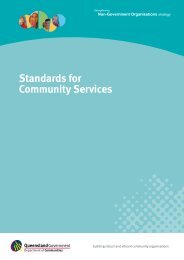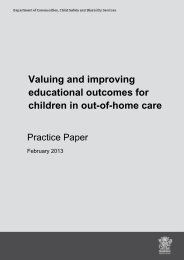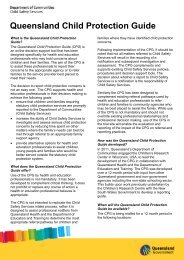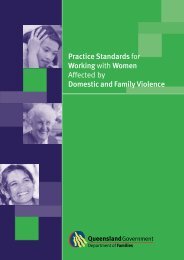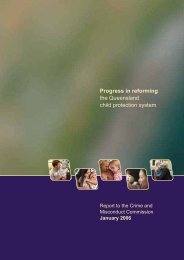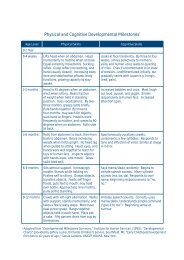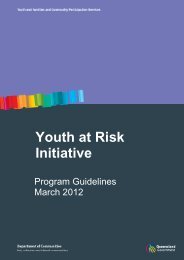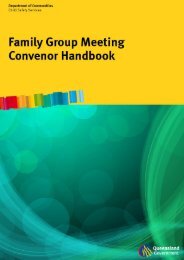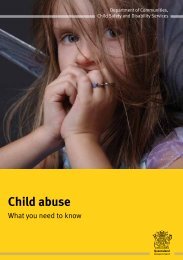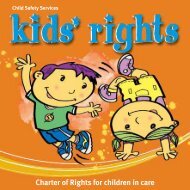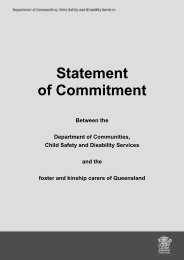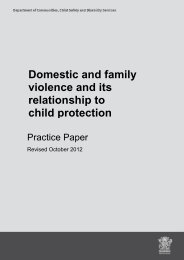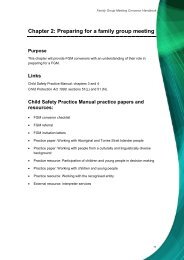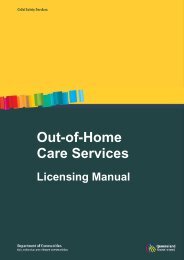Review of the Domestic and Family Violence Protection Act 1989 ...
Review of the Domestic and Family Violence Protection Act 1989 ...
Review of the Domestic and Family Violence Protection Act 1989 ...
Create successful ePaper yourself
Turn your PDF publications into a flip-book with our unique Google optimized e-Paper software.
any criminal justice responses for breaches should be confined to<br />
restorative justice approaches or <strong>the</strong>rapeutic interventions such as<br />
counselling.<br />
At almost half <strong>the</strong> statewide consultation sessions, <strong>the</strong>re was support<br />
for family members to be able to name a child as a respondent<br />
to a domestic violence order. Those who opposed orders being<br />
taken out against children in family relationships (32 respondents)<br />
raised issues around ensuring that children underst<strong>and</strong> orders <strong>and</strong><br />
<strong>the</strong> consequences <strong>of</strong> breaching orders, including <strong>the</strong> potential for<br />
increased involvement <strong>of</strong> children in <strong>the</strong> criminal justice system <strong>and</strong><br />
increased homelessness.<br />
There were 39 respondents who considered that changes were<br />
desirable to <strong>the</strong> way consent orders are made so that <strong>the</strong> <strong>of</strong>fender<br />
underst<strong>and</strong>s <strong>the</strong> conditions <strong>and</strong> consequences <strong>of</strong> <strong>the</strong> order. The<br />
following concerns were expressed regarding consent orders: <strong>the</strong><br />
effect <strong>of</strong> devaluing <strong>the</strong> order; <strong>the</strong> lack <strong>of</strong> accountability <strong>of</strong> perpetrators;<br />
implications for <strong>the</strong> safety <strong>of</strong> women <strong>and</strong> children; <strong>and</strong> <strong>the</strong> resulting<br />
weakened response to domestic violence in <strong>the</strong> <strong>Family</strong> Law Court.<br />
Aboriginal <strong>and</strong> Torres Strait Isl<strong>and</strong>er people <strong>and</strong><br />
domestic <strong>and</strong> family violence<br />
The current domestic violence legislation in Queensl<strong>and</strong> does not<br />
make specific reference to additional requirements or issues that<br />
may apply to domestic violence involving Aboriginal <strong>and</strong> Torres Strait<br />
Isl<strong>and</strong>er people, especially in communities.<br />
There were 31 respondents that considered <strong>the</strong> current domestic<br />
relationship definition clearly includes <strong>the</strong> wider concept <strong>of</strong> family<br />
which is relevant to Aboriginal <strong>and</strong> Torres Strait Isl<strong>and</strong>er communities,<br />
while 30 o<strong>the</strong>rs believed <strong>the</strong> definition needed to provide more detail<br />
(for example, a reference to kinship principles) <strong>and</strong> recognise cultural<br />
family structures <strong>and</strong> responsibilities. Six respondents considered <strong>the</strong><br />
current legislation <strong>of</strong>fered insufficient protection to children <strong>and</strong> young<br />
people <strong>and</strong> did not adequately represent complex family or intimate<br />
relationships that exist within Aboriginal <strong>and</strong> Torres Strait Isl<strong>and</strong>er<br />
communities.<br />
One Aboriginal <strong>and</strong> Torres Strait Isl<strong>and</strong>er organisation considered<br />
that payback was a big issue for victims <strong>of</strong> domestic violence in<br />
communities. Victims are <strong>of</strong>ten fur<strong>the</strong>r abused by family or associates<br />
<strong>of</strong> <strong>the</strong> perpetrator as a result <strong>of</strong> customs <strong>and</strong> it was recommended<br />
that this be referred to in <strong>the</strong> legislation so that victims could obtain<br />
protection. Respondents considered ineffective <strong>and</strong> inefficient<br />
penalties can lead to inappropriate ‘payback’ <strong>and</strong> <strong>the</strong> criminal justice<br />
system appearing weak.<br />
Seven respondents identified <strong>the</strong> different dynamics <strong>and</strong> issues<br />
associated with domestic violence in Aboriginal <strong>and</strong> Torres Strait<br />
Isl<strong>and</strong>er communities <strong>and</strong> <strong>the</strong> need to tailor responses to meet<br />
18



